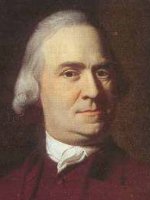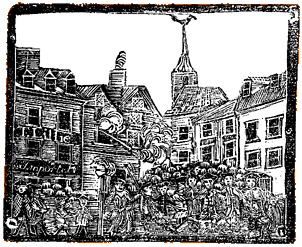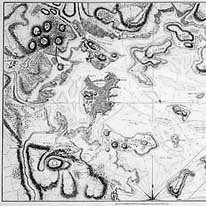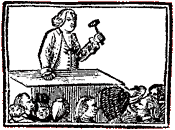 Prof. Peter Charles Hoffer wrote Past Imperfect as a response to the historiographical scandals of 2002, two of which touched on the Revolutionary period. Hoffer also wrote in response to a division he sees between academic historians and the reading public. But are those two things related?
Prof. Peter Charles Hoffer wrote Past Imperfect as a response to the historiographical scandals of 2002, two of which touched on the Revolutionary period. Hoffer also wrote in response to a division he sees between academic historians and the reading public. But are those two things related?
The first part of Hoffer's book traces broad trends in writing American history over the past century and more. I doubt anyone would argue that, compared to sixty years ago, academic historians now pay more attention to women and less, relatively, to men. More attention to our society's racial and ethnic minorities and less to dominant northern European groups. More attention to the poor and less to the rich. More attention to social movements and less to military movements. More attention to economic trends and less to individual politicians. More attention to history's "losers" and neglected and less to already celebrated heroes. And under today's egalitarian values it would be hard to complain that those changes are a bad thing, though some people try. Most who criticize the trends say simply that they've gone too far.
Be that as it may, the second part of Past Imperfect looks at the four scandals that caught more attention from the public than the average university-press history book—indeed, more than any successful university-press history book. Those controversies are:
- Emory University professor Michael Bellesiles's Arming America was found to be riddled with misrepresentations of sources and facts, particularly his statistics on probate inventories in the 1700s. His explanations of those errors were untenable.
- Retired University of New Orleans professor Stephen Ambrose, author of Band of Brothers and many other books, was accused of borrowing too much language from his stated sources. The complaints involved several books written over many years.
- Doris Kearns Goodwin acknowledged having replicated the language of Lynne McTaggart's biography of Kathleen Kennedy and a couple of other sources for her 1987 book, The Fitzgeralds and the Kennedys. Goodwin and McTaggart had reached a financial settlement years before.
- Mount Holyoke College professor Joseph Ellis admitted making false statements about his own role in two of the three major historical events of the 1960s, the Vietnam War and the Civil Rights movement. He had recently won a Pulitzer Prize for Founding Brothers, about the political personalities of the early republic. Unlike the other three cases, Ellis's false claims never appeared in his books.
I don't rank the Goodwin kerfuffle with the other three. Goodwin had been a professor of government in the 1970s, but wrote her Kennedy saga after leaving academia. The
New York Times called that book "popular history." Since when have commercial books about the Kennedy family been held to the standards of scholarly history? Of course, plagiarizing language is wrong, even if you acknowledge the source in notes; I question whether Goodwin's book was an example of
academic history.
For a fourth scandal, I might have substituted the participation of Alf Mapp, Forrest MacDonald, Harvey Mansfield, and other professors in the Thomas Jefferson Heritage Society's "Scholars' Commission," selected to fog the evidence that Jefferson had children by a woman he kept enslaved. But relatively few people noticed that report or linked it to the individual scholars who signed it.
Bellesiles's falsehoods had been well documented when Hoffer wrote, first by
Clayton E. Cramer (then an independent scholar) and later by law professors and historians, so Hoffer's summary added little for me. (You can sample my evolving remarks on the Bellesiles case
here,
here,
here, and
here. Otherwise, here's the most useful thing I can tell you: It's pronounced, "bel-LEEL.")
Past Imperfect shows that Ambrose had borrowed stirring language from his sources without quote marks for many years. Goodwin had done the same, but on a smaller scale. Hoffer also notes that the standards for what constituted plagiarism were much more lenient in the 1800s. I wish he'd dug into whether our culture's standards for plagiarism (at least for books) became more strict in just the past couple of decades. In our most recent bloodletting on this issue, the national press jumped all over teen novelist
Kaavya Viswanathan for writing genre fiction that read very much like other genre fiction—which is what genre fiction is supposed to do. Viswanathan clearly did replicate short passages from a couple of other writers, but several trumpeted examples were simply her versions of standard set-pieces, like the makeover scene.
The most interesting part of
Past Imperfect's second half, I think, is Hoffer's comparison between Joseph Ellis's approach to writing history and his fabulism about his own career. As a storyteller, Ellis is terrific.
Founding Brothers is a delightful series of linked vignettes.
Passionate Sage is a great character study. The strength of his books is getting into the main figures' heads. The same skill that lets Ellis imagine the thinking and interaction of the U.S. of A.'s first politicians, Hoffer suggests, led him to be too imaginative when he spoke to students and interviews about his own career. (Ellis did serve as an officer in the Vietnam-era army, but he taught at West Point instead of fighting in Vietnam. He was involved in some political activities during the late 1960s, but did no civil-rights organizing in the South.) Hoffer's analysis reminds us that a historian's greatest strength can also be a weakness.
I think the big hole in
Past Imperfect is the gap between the two halves. They don't fit together. Ambrose made his name writing mostly about white men at war. Also white men in the Oval Office, white men crossing North America, and Crazy Horse. Given the trends described in my second paragraph above, Ambrose wrote an old-fashioned style of history. Goodwin, too, has concentrated on biography of "great men" and their families: Kennedys, Roosevelts, Johnson, and now Lincoln. Ellis focuses on the elite political class; some historians say he gives too little attention to the social and other forces that determined what those top men could and wanted to do. Ellis's preface for
Founding Brothers, in return, argues for the importance of individual decisions in history. So these three authors are
not representative of academic historians as Hoffer described the class.
What about Bellesiles? His book promised to look at the broad American population, not just the wealthy (who owned guns disproportionately, he claimed). It offered a simulacrum of social history through probate inventories. But Bellesiles's
earlier work was on Ethan and Ira Allen and the Green Mountain Boys: white, Anglo-Saxon men long lionized for their leadership in military and political affairs. Ethan Allen is even a brand name. Bellesiles has never dipped into the biographical genre as deeply as Ambrose, Goodwin, and Ellis, but his early work had clear ties to the traditional approach Hoffer describes.
Past Imperfect links its two halves this way: academic historians lost the affection and trust of the general public in the late 1900s. Therefore, the public was primed to jump on the scandals of 2002, and see them as tainting the whole profession. Yet two of those scandals (Ambrose, Goodwin) had arisen because of authors' wishes to please popular audiences with stirring language, a third (Ellis) to please them with a personal link to important movements. Bellesiles published through a commercial press that did no peer review but an excellent job of getting pre-publication news coverage and prominent reviews. One half of
Past Imperfect is about historians not pleasing the public's tastes. The other half is about historians trying too hard to please. But, as I wrote above, are those two things related?






